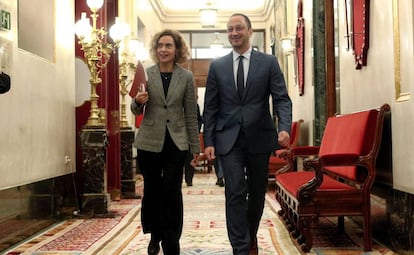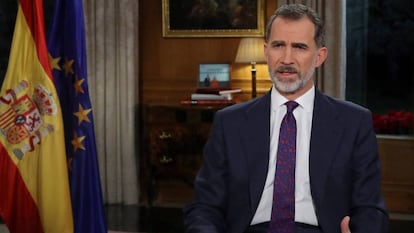Spanish Congress prepares for possible end-of-year investiture vote
As the Socialist Party and Catalan Republican Left get closer to a deal to get Pedro Sánchez sworn back into office, lawmakers are asked to stay near Madrid in case they need to rush back from holidays

While it appears likely that Spain will end the year without a new government in place, Congress officials have penciled in December 28, 29 and 30 as days in which the lower house could convene to vote in the new prime minister.
Many lawmakers have been asked by their parties to make sure they are easy to reach even if they go away for a few days during the Christmas break, in case they need to rush back to Madrid.
If the State wants to continue on the path of repression, defeat will only be tougher for the Spanish justice system
Marta Vilalta, ERC spokesperson
The unusual decision leaves the door open to a hypothetical investiture session right in the middle of the holidays, reflecting the new volatility of Spanish politics.
Caretaker PM Pedro Sánchez, of the Socialist Party (PSOE), wanted a new Cabinet in place before the end of the year, but negotiations have been dragging out following his inconclusive victory at the repeat general election of November 10.
Congressional and PSOE sources said that the decision to set dates for a potential investiture session does not necessarily mean that Sánchez has clinched a final deal with the Catalan Republican Left (ERC), a separatist party whose abstention at the investiture vote would ensure Sánchez’s return to La Moncloa.

The PSOE leader is trying to secure the 176 votes he needs at the first round of the investiture vote; failing that, a second round would be held where only a simple majority of more yes than no votes is required to get him confirmed in office.
While Sánchez has a preliminary deal for a governing coalition with the leftist Unidas Podemos, together they hold 155 seats in Congress, making further support necessary.
Catalan support
The move comes in the midst of ongoing talks between the PSOE and ERC, which has said that it is in no hurry to reach a deal, and that it’s all “about content,” not about the calendar.
This party wants the central government to make a gesture of goodwill by supporting a recent ruling by the Court of Justice of the European Union (CJEU) that found that ERC leader Oriol Junqueras – who is serving a prison sentence in Spain over his role in the failed unilateral secession attempt of 2017 – became a Member of the European Parliament (MEP) as soon as he was elected on May 26.
The king’s speech

Felipe VI of Spain will address the nation today in his traditional Christmas Eve speech. This year, the monarch will seek to send out a message of confidence at a time of political uncertainty and polarization, in a country that remains under a caretaker administration and could be facing yet another repeat election next year if no deal emerges soon.
The complex political situation means that the speech was recorded just 24 hours before its scheduled airing time, to prevent the possibility of it sounding obsolete due to last-minute developments.
It will not be the first time that the king’s Christmas speech takes place under a caretaker government: it happened in 2015 as well, but that was because only four days had elapsed since the election. This time, it has been eight months since the original election of April 28, which was followed by a repeat vote on November 10.
Junqueras never picked up his MEP credentials because he was in preventive custody at the time, but the EU court argues that he enjoyed immunity and should have been allowed to do so. Now, Spain’s Supreme Court has asked the State Attorney’s Office – which answers to the Justice Ministry – for guidance on how to apply this EU ruling. The ERC is hoping for a favorable decision that will let Junqueras leave prison to pick up his MEP credentials.
This decision had been expected on Monday, but it has been delayed as state attorneys seek a formula to let the ERC leader out temporarily but without questioning the Supreme Court ruling that sentenced him to 13 years in prison for sedition. The ERC would also like for state attorneys to declare null the entire trial that sentenced Junqueras and other secessionist leaders to prison.
Marta Vilalta, the ERC spokesperson, has said that the success of Sánchez’s investiture bid will largely depend on what the state attorneys’ report says. “If the State wants to continue on the path of repression, defeat will only be tougher for the Spanish justice system. The later it rectifies, the harder it will fall.”
Besides this point, the PSOE and ERC are negotiating a document setting out the rules for a future dialogue between the central and Catalan governments.
English version by Susana Urra.
Tu suscripción se está usando en otro dispositivo
¿Quieres añadir otro usuario a tu suscripción?
Si continúas leyendo en este dispositivo, no se podrá leer en el otro.
FlechaTu suscripción se está usando en otro dispositivo y solo puedes acceder a EL PAÍS desde un dispositivo a la vez.
Si quieres compartir tu cuenta, cambia tu suscripción a la modalidad Premium, así podrás añadir otro usuario. Cada uno accederá con su propia cuenta de email, lo que os permitirá personalizar vuestra experiencia en EL PAÍS.
¿Tienes una suscripción de empresa? Accede aquí para contratar más cuentas.
En el caso de no saber quién está usando tu cuenta, te recomendamos cambiar tu contraseña aquí.
Si decides continuar compartiendo tu cuenta, este mensaje se mostrará en tu dispositivo y en el de la otra persona que está usando tu cuenta de forma indefinida, afectando a tu experiencia de lectura. Puedes consultar aquí los términos y condiciones de la suscripción digital.








































